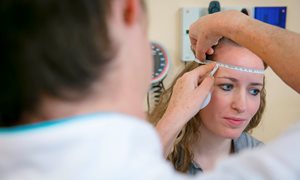
Initially there was no doubt a specific mutation in the USH2A gene caused the eye disease retinitis pigmentosa. Spanish research undermined that clarity and left patients in limbo. Until new research by PhD candidate Janine Reurink made it abundantly clear that the cause is indeed to be found in that USH2A gene. A textbook example of science in action.
We know of ten different genes that can cause Usher syndrome if they contain a mutation. Mutations in these genes eventually lead to deafness and blindness in patients with Usher syndrome. Mutations in Usher genes sometimes ‘generate’ other disorders as well. For example, a specific mutation in the Usher2A gene (USH2A) causes the eye disease retinitis pigmentosa (RP) when inherited from both father and mother. This mutation causes one spot in the USH2A protein to change the amino acid cysteine to phenylalanine, another amino acid. All this was genetically and clinically fine-tuned at the end of the last century. If you had such a specific double mutation in the USH2A gene, you didn’t have Usher syndrome but RP and the clinical problems were limited to blindness.
Smoldering controversy
Then suddenly a publication appeared about a Spanish family with RP. It wrote that researchers had found two individuals with exactly those specific USH2A mutations. But without any vision problem, which after all is an essential characteristic of RP! Erwin van Wijk, who has been researching Usher syndrome at the Radboudumc for over more than ten years: "That caused rather a lot of commotion among researchers and patients, because it meant this specific mutation could not be the cause of RP! Everyone who had previously received this diagnosis had apparently been misdiagnosed. So the real cause had to be found somewhere else in the genes."
The publication causes many clinical genetics centers around the world to stop diagnosing RP on the basis of this USH2A mutation and all these patients should actually be re-screened. This also applies to Nijmegen. In the meantime, doubts continued. Was the screening in this Spanish family complete and reliable enough? - the results were never confirmed in any other study. Requests from different research groups to check the DNA of those families were not granted. Thus, a smoldering controversy about the value of the Spanish research ensued.
No alternatives mutations found
In recent years, Van Wijk and colleagues developed a promising therapy for a number of mutations in Usher genes. This therapy is based on a technique in which a piece of the RNA is ‘taped off’ (exon skipping). This prevents the mutation from being read and creates a protein that once again functions properly. These therapeutic 'genetic patches' can also be used for the specific USH2A mutation, but based on the Spanish family research the causal link with the eye disease is being questioned. As long as it’s unclear whether or not this mutation causes RP, no health insurance company will ever reimburse such a therapy. So a conclusive answer is needed. That proof was exactly what Janine Reurink set out to provide as part of her doctoral research.
Reurink: "First of all, we looked at several patients with the USH2A mutation to see if another explanation could be found for the disorder. To do this, we mapped their entire genome and examined it on all sides. The result? We did not find any alternative genetic explanation. Based on our research, the USH2A mutation remains the only possible explanation."
Crystal clear evidence
In Nijmegen, much Usher research is done in zebrafish. This time it was also used for additional research, looking for as much evidence as possible. Reurink: "With the CRISPR/Cas9 system, a molecular scissors with which pieces of DNA can be very precisely cut away and replaced, we made a zebrafish with exactly the same mutation as in humans. Analysis of retinal cells in the eye of these fish showed that the corresponding proteins are then no longer or hardly produced. Normal production is really very thoroughly disturbed by the mutation. What's more: as a result, other essential proteins for vision no longer end up in the right places. We also made an ERG, a kind of brain film for the eye. It demonstrated with crystal clarity that vision is really affected in zebrafish with this mutation. In short, extensive genetic bio-molecular and functional research clearly shows that the USH2A mutation is indeed the underlying cause of this form of retinitis pigmentosa. In terms of a detective novel, we now really have tracked down the culprit."
Impact on healthcare
The research by Reurink and colleagues has been published in NPJ Genomic Medicine. For people with RP with a USH2A mutation, it’s clear now that this is the real causative, pathogenic mutation. Further search for a (non-existent) cause is no longer necessary. Meanwhile, the clinical genetics laboratories at Radboudumc have adjusted their diagnostics accordingly. Something that many more laboratories worldwide are likely to do in the near future. Moreover, patients are now eligible for therapy as soon one is available. A nice example of PhD research with impact on healthcare.
-
PhD defence Janine Reurink - USH2A-associated disease. Genetics, pathogenesis and treatment
Thursday April 6, 2023 at 12.30 pm
-
Want to know more about these subjects? Click on the buttons below for more news.






